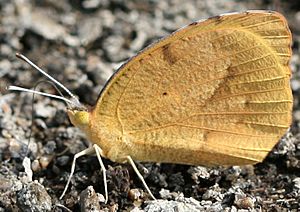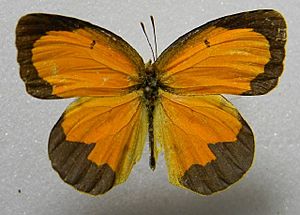Sleepy orange facts for kids
Quick facts for kids Sleepy orange |
|
|---|---|
 |
|
 |
|
| Conservation status | |
| Scientific classification | |
| Kingdom: | |
| Phylum: | |
| Class: | |
| Order: | |
| Family: | |
| Genus: |
Eurema
|
| Species: |
E. nicippe
|
| Binomial name | |
| Eurema nicippe (Cramer, 1779)
|
|
| Synonyms | |
|
|
The sleepy orange (scientific name: Eurema nicippe) is a bright and active butterfly. You can find it in North America, the Caribbean, Costa Rica, and Belize. It belongs to the Pieridae family, which includes many yellow and white butterflies.
Contents
About the Sleepy Orange Butterfly
The sleepy orange butterfly is mostly bright orange. Its upper wings have wide black edges. On the front wing, there is a small, thin black spot near the edge.
Some people think this black spot looks like a closed eye. This might be how the butterfly got its "sleepy" name. However, others say the name is wrong. When this butterfly is bothered, it flies away very quickly!
The underside of its wings changes with the seasons. In summer, they are bright yellow with reddish-brown marks. In winter, they look browner and have more markings. This butterfly has a wingspan of about 1.4 to 2.2 inches (35 to 57 mm).
Where Sleepy Oranges Live
You can find sleepy orange butterflies in many different places. They like old fields, roadsides, and the edges of woods. They also live near swamps, wet meadows, and open forests. You might see them by ponds, rivers, and in valleys too.
The Sleepy Orange Life Cycle
The sleepy orange butterfly goes through several stages in its life. This is called its life cycle.
Eggs
The eggs are a pale greenish-yellow color. They turn red just before the tiny caterpillars hatch. Female butterflies lay their eggs on the underside of host plant leaves. Sometimes, they lay them on flowers instead.
Caterpillars
After hatching, the eggs become larvae, also known as caterpillars. These caterpillars are fuzzy and grayish-green. They have a whitish-yellow stripe along their side.
Chrysalis
When a caterpillar is ready to change, it forms a chrysalis. This is like a protective case. The chrysalis can be green or brownish-black. Inside, the caterpillar transforms into a butterfly.
Adult Butterflies
Adult sleepy orange butterflies fly south to warmer places for the winter. They usually have two to four groups of offspring each year. These groups are called broods.
Favorite Host Plants
Host plants are specific plants that female butterflies lay their eggs on. The caterpillars then eat these plants to grow. Sleepy orange caterpillars like to eat different types of senna plants, including:
- Partridge pea, Chamaecrista fasciculata
- Wild sensitive plant, Chamaecrista nictitens
- Senna hebecarpa
- Privet senna, Senna ligustrina
- Senna marilandica
- Senna mexicana
- Senna obtusifolia
Similar Butterflies
Sometimes, the sleepy orange butterfly can look like other butterflies. Here are a couple of similar species:
- Colias eurytheme - the orange sulphur
- Eurema proterpia - the tailed orange
See also
 In Spanish: Eurema nicippe para niños
In Spanish: Eurema nicippe para niños
 | Leon Lynch |
 | Milton P. Webster |
 | Ferdinand Smith |



